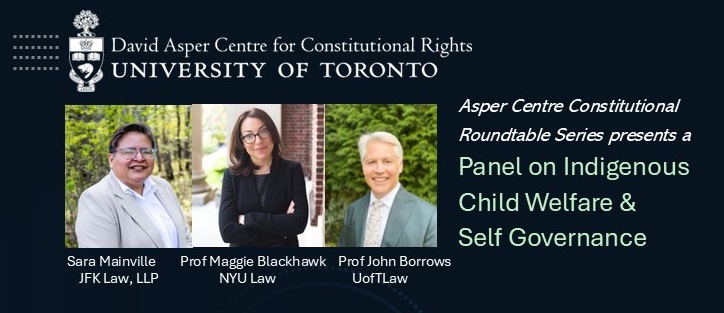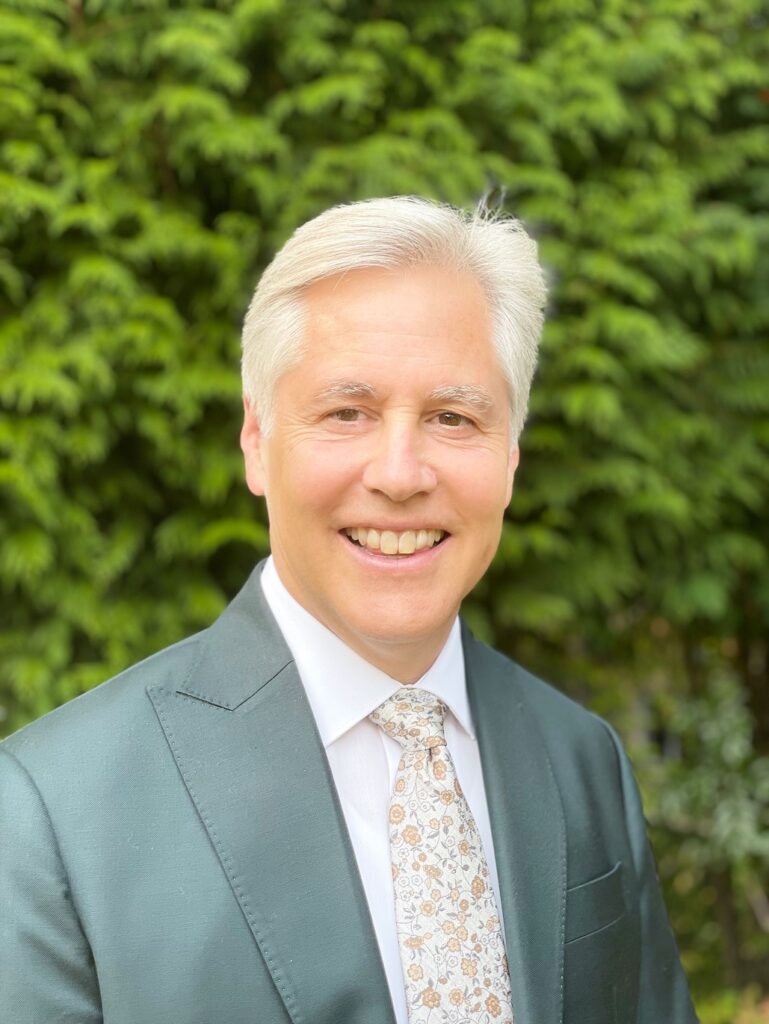by Taoran Li
On 31 October 2024, the Asper Centre’s Indigenous Rights Working Group presented a panel event to unpack the significant legal issues and potential future implications of two recent decisions on Indigenous child welfare and self-governance. The decisions Haaland v Brackeen, 599 U.S 255 (2023) issued by the Supreme Court of the United States and Reference re An Act respecting First Nations, Inuit and Métis children, youth and families, 2024 SCC 5 issued by the Supreme Court of Canada, determined the validity of federal legislation introduced to address historic and ongoing harms caused by the apprehension of Indigenous children from their families by settler governments in both Canada and the United States.
The panel, moderated by Cheryl Milne, the Executive Director of the Asper Centre, consisted of Maggie Blackhawk, professor at New York University and teacher of federal Indian law, constitutional law and legislation; Sara Mainville, partner at JFK Law LLP and Chief of Couchiching First Nation; and, Professor John Borrows, the Loveland Chair in Indigenous Law at the University of Toronto Faculty of Law.
The idea for the panel and the questions formed for the panelists were the result of research conducted by the Asper Centre’s Indigenous Rights Working Group in 2023. Isabel Klassen-Marshall, one of the co-leaders for the Working Group began the discussion by introducing the facts and issues in the two cases. In Reference re An Act respecting First Nations, Inuit and Métis children, youth and families, 2024 SCC 5 the Canadian Supreme Court considered the validity of “An Act Respecting First Nations, Inuit and Metis Children, Youth and Families” or Bill C-92, an Act passed by Parliament in 2019. The Act formally recognized the inherent Aboriginal right of self-government, including jurisdiction over child and family services and established mechanisms through which Indigenous communities can exercise their authority, either by enacting their own laws or through coordination agreements negotiated with federal and provincial governments.
In response to a reference question triggered by the Attorney-General of Quebec, the Quebec Court of Appeal held the provisions in the Act to be valid, except for the provisions which gave Indigenous laws the force of federal law. Upon appeal to the Supreme Court, the Supreme Court of Canada upheld the Act as a whole as constitutionally valid. The Supreme Court’s approach differed from the Quebec Court by recognizing constitutionality through a federalism analysis, rather than a finding of a generic s 35 right to self-government over child and family services. The Court held that the Parliament’s explicit affirmation of an inherent right to self-government was an expression of Parliament’s position on the scope of s 35, rather than any amendment of the Constitution or actual recognition of a s 35 right.
Haaland v Brackeen related to a constitutional challenge to the Indian Child Welfare Act (ICWA), brought by the State of Texas, three families who wished to adopt or foster Indigenous children and an Indigenous woman who wanted non-Indigenous parents to adopt her biological child. The ICWA is a federal law enacted in 1978 providing for minimum standards for foster care and adoption cases involving Indigenous children. It overrides aspects of state family law to preserve the stability of tribal nations and communities, including a placement preference in adoption cases for relatives, members of the child’s tribe, and members of other Indigenous families. The claimants’ challenge comprised many grounds, including that Congress lacked the authority to enact ICWA and that ICWA violated the Equal Protection Clause as the law prioritized placement of children based on race rather than understandings of Indigenous nationhood. The U.S. Supreme Court dismissed the challenge and upheld ICWA. In doing so, it confirmed Congress has a broad plenary power to legislate with respect to different tribal nations. The equal protection claim was dismissed on the basis of standing.
The panel discussion covered many practical and theoretical implications of the decisions: from the mechanisms and architecture of Bill C-92 for resolving conflict between Indigenous and provincial laws and individual and collective rights, to how the decisions impact the existing division of powers regarding child welfare between federal and provincial governments, to how the lower courts are already interpreting and applying the legislation. A strong theme throughout the discussion was the underlying colonial dimension to the decisions and the unresolved question of inherent Indigenous self-government. Professor Borrows noted that by only recognising that the Bill C-92 legislation “acts as if” there is inherent right to self-government under s 35, the Supreme Court of Canada is not committed to uphold or deny the fact that Indigenous peoples might have an inherent right to self-government in their relationship to their child and family services. On the other hand, Professor Borrows commented this incrementalism has a positive element as Parliament binds itself to proceed as if that right already exists and allows parties to gain experience in exercising responsibilities with regards to child well-being.
Similarly, the colonial dimension also permeates through Haaland v Brackeen in the context of American colonialism. Professor Blackhawk explained that the Supreme Court in upholding ICWA both reaffirmed the power of American colonialism but also expressed concerns over its limits. The Court reaffirmed American colonialism by confirming the power Congress had to colonize Native Americans within the territorial borders of the United States lies in the “powers inherent in sovereignty” in the Constitution of the United States. This term captures a body of laws from the 18th and 19th centuries founded upon concepts such as the law of nations and natural law, which rested on the right of “civilized nations” to govern “savage nations” through forms of colonization. The body of laws was eventually flattened into the plenary power doctrine, where the court withheld using its own review power to oversee the process of colonialism due to the political branches possessing “plenary power”. In this sense, Haaland v Brackeen represents an odd juncture where reconstruction amendments that aim to solve the failure of human enslavement are also furthering the American colonial project.
Sara Mainville brought a critical practitioner viewpoint to the panel and explained the available mechanisms to Indigenous governing bodies in Canada to enforce their own laws and how those mechanisms would interact with existing provincial enforcement systems and laws. Sara first drove home the message that the 19th century governance of the Indian Act is still a reality for Indigenous peoples in Canada, and that governance capacity for Indigenous communities presents a great challenge. However, Bill C-92 does assist Indigenous governing bodies, including section 20(3) of the Act which provides that the laws of an Indigenous governing body who has entered into a coordination agreement, or made reasonable efforts to do so for one year, will have the force of federal law. This section is an example of innovation in Bill C-92 that helps to resolve issues in advance of coordination agreement negotiations.
To reiterate a point made by Professor Blackhawk, there is space for colonized people to share strategies that have been empowering in their colonial jurisdictions. The panel is illustrative of the merits of this.
View the webcast of the panel discussion HERE.
Taoran Li is a Research and Communications Assistant with the Asper Centre. She is an international student from New Zealand attending the Master of Laws program at the University of Toronto Faculty of Law.


 Maggie Blackhawk
Maggie Blackhawk
 John Borrows
John Borrows